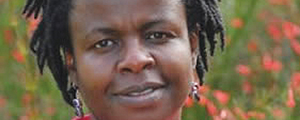
University of Zimbabwe. 1985. Not exactly a good year to be in first year. Female. And of indeterminate ethnicity.
Obituary by Everjoice Win
It was supposed to be the best times for those of us who had grown up in the gwazhas (villages), and smaller towns. Coming to the capital city.
To the big one and only vhaa (university). Away from parents, strict boarding school rules, and nosy neighbours. We got student grants, with some extra cash to spend, (thanks to Robert Mugabe’s education policies).
Many of us lost our heads. Some lost their panties. Some bought pants to wear publicly for the first time. And we walked funny in them. The lecturers gave us hour-long sermons, and walked out on the dot.
We didn’t know what to make of this method of teaching. So we went to the Students’ Union, drank our payout. And lost our heads once more. Well, if you were a man that is. Or a clever girl, who spoke with a twang (acquired from one year of schooling at a former whites’ only school).
For the rest of us of the female species, you kept your head down, walking funny in those new jeans. But knowing the boundaries: Don’t go to the Students’ Union at night or you will be raped. Stay away from boys in groups because they will harass you. Don’t drink, don’t smoke. Don’t, don’t, don’t.
I was strange anyway. Not quite Shona, not quite Ndebele. From bang in the middle of the country. So I could hang with the other group on Mondays and with the other on Fridays.
- Chamisa under fire over US$120K donation
- Mavhunga puts DeMbare into Chibuku quarterfinals
- Pension funds bet on Cabora Bassa oilfields
- Councils defy govt fire tender directive
Keep Reading
I could talk about the massacres going on in Matabeleland with the one group.
But not with the others who vociferously denied that it was happening. Being non-aligned was dangerous. You had to choose sides.
Only if you didn’t know Thomas Deve. A wiry little man. With a bit of a stoop. He sported “unkempt hair” (as my father would have spat), smoking his life away.
Smiling at one and all. Jumping from one activity to the next. Always talking. Always gesticulating.
I soon met his friend George (Charamba), also doing his masters degree, but in English. They made a weird pair. Tom, the skanking, smoking, drinking, fun-loving one. George, the bookish, ever serious, teetotaller!
The one loved loud reggae, the other loved Orchestra Dendera Kings and Zairean rhumba. They had furious political debates.
Half the time I had no idea what they were fussing and fighting about. I just listened. Then when they were done, we would all have a good drink, a laugh. And still remained friends.
I soon discovered we shared a love of reggae. He brought me lots of cassettes (those little spooled things that you stuck into a little portable radio (bought with that payout), and played loudly. Annoying your room mate or the girls next door.
Till the spool broke, or got entangled. He introduced me to I-Jahman. Eeka-Mouse. Dillinger. John Holt. All kinds of singers my brother had never introduced me to. “Fluffy reggae,” he said, dismissing my beloved Bob Marley and Third World. “There is no consciousness here, my friend. That is just doof-doof-doof. All about love, love, love. Why do we want to just sing about love!?
Listen to the lyrics.” (Oh, that is what words to songs were called? We just called them words. Lyrics he called them). I got hooked. He invited me to the Students’ Union to go skanking. Skanking? I had never skanked before. I was too shy to skank. In public too?
Tom held my hand. Took me to my first reggae party, and my first night out at the dreaded Students’ Union! There I was, throwing one leg this way, and the other that way, among them dangerous-looking ganja-puffing beer-fuelled boys of the University of Zimbabwe. There were dozens of them.
All of them with similar hair to Tom’s! We skanked all night. Any time someone tried to place their hand on me, Tom was there in a flash. “Idrin, we don’t do that to our sistren here.” They listened to him. Respected him. The Elder had spoken. I was left in peace.
A few weeks later. I ventured back to the SU on my own. There was to be more skanking. I did not know where Tom was (this was in the days before cellphones in case you are wondering). Besides, I needed to grow up. Be my own girl. Yeah right. A new idrin I had never met made a beeline for me. I kept ducking, he kept pulling me. I wanted to leave. But I wanted to stay and skank.
I got wedged into a corner. Blouse torn. Poked by smelly fingers. Then Tom materialised in the darkness. Beat the living daylights out of my attacker. After that, the SU was mine. Reggae nights were the highlight of my life at UZ. Tom continued to be by my side. I wondered what time he studied for his MPhil. He just seemed preoccupied with all kinds of projects.
Soon, he had launched, the Society for African Studies (SAS), with other friends. Tom organised speakers. Lectures. Africa day events. Solidarity events for South Africa. For Namibia. For Palestine. For the Saharawi Republic (where was that?). I learnt about events, struggles, people, leaders, I had never heard about. They didn’t teach us that stuff in the formal African history lectures.
“They are reactionary these people! Very reactionary! We must teach young people a different history of Africa,” said Tom. I did not know what reactionary meant. He had to give me a whole lesson on that word. My lecturers didn’t speak such language. We joined the team producing the students’ magazine, FOCUS. Together with Tawana Kupe, (the late), Dr Lawrence Tshuma,











